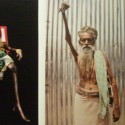Former MuchMusic host Namugenyi Kiwanuka aims to save Africa
A lot has changed in the life of Namugenyi Kiwanuka since she left MuchMusic more than five years ago.
The former VJ often referred to as “Nam” has relocated from Canada to London, England, has tied the knot and has some fond memories of her time working at the music station. “I loved meeting people, interviewing people, especially people that were at the top of their game,” Kiwanuka says. “But I always felt guilty. I always felt I didn’t deserve the position I had and I felt like I wasn’t doing anything to help people back home.”
Originally from Uganda, Kiwanuka came to Canada as a refugee and began to volunteer with War Child Canada while she was hosting shows like MuchVibe and The DownLo at Much. After stints with BET in the US and NBA XL on Sportsnet, she followed her instincts and took a job as a media trainer with Journalists for Human Rights in Freetown in Sierra Leone. It was a trip that led her to her current focus — bringing attention to the untold stories of everyday people in Africa.
Kiwanuka is currently working on This is Africa — a documentary series she has been shooting to showcase the positive aspects of the continent.
While she saw troubling realities like infants whose limbs had been hacked off against a backdrop of civil war and strife, she also saw people doing inspiring things in the face of unspeakable adversity. One man she met had lost almost half of his body to an explosion, yet he spearheaded the formation of a grassroots movement to take care of fellow amputees so that they would not have to resort to begging in the street. “It was really impressive to see someone doing something so noble and life-changing with no resources,” Kiwanuka says. “When people hear about Africa, it’s always negative. But there [are] a lot of good stories on the ground and people [who] are doing wonderful things and I really wanted to be able to get those stories out.”
She also came across disabled Congolese women who empowered themselves by putting their crafts on eBay as well as a group of women with HIV/AIDS who pulled themselves out of poverty by selling beads. “The women doing the beads are making them out of paper; so they’re recycling and they’ve managed to turn something that would be considered garbage into something beautiful and something that can be traded for goods,” Kiwanuka says. “And in the process, there is now a whole village — home to 130 families — built out of [the profits from] these beads and this whole village is environmentally friendly.”
It is Kiwanuka’s palpable passion to make the stories of people like these widely known and she is hopeful it will eventually be broadcast when she secures enough funding.
A near-death experience in Sierra Leone, where she contracted cerebral malaria (a deadly strain of malaria that often kills children in a day) helped to crystallize the work she is now doing on This is Africa. Kiwanuka was prescribed a banned drug to treat the malaria, with dire consequences. She went into epileptic shock and was rushed to hospital fearing she would not make it there alive. “I’ve never been so scared in my whole life,” she says, becoming very emotional remembering the journey. “I believe it was by the grace of God that I didn’t die. My [then-]fiance said to swallow air like a fish. I couldn’t feel it coming in. I felt like I was going to black out and I kept hearing people who I love, like my Gran, my cousins [saying], ‘If you close your eyes you’re not going to wake up. Keep your eyes open.’ And I knew if I closed them I wouldn’t see my family again.”
She eventually fully recovered after being flown to London for treatment. An article she wrote about the traumatic experience for the Toronto Star even prompted the Sierra Leone government to issue a warrant for her arrest. They were, however, removed from power in an election just days later.
Kiwanuka has absolutely no regrets. She is cognizant of the fact that she was very lucky to have the resources to get proper treatment, unlike so many others, and consequently teamed up with the Red Cross to be an ambassador for their Malaria Bites campaign, distributing mosquito nets in Mali. “I’m glad it happened,” Kiwanuka says. “[Initially] I felt like ‘Why, why, why?’ I thought that this was what I was supposed to do. I was trying to give back; why would this happen to me? And then I was like, end the pity party, it happened for a reason. And the reason is, you know first-hand and now you can try to tell the story of what people are going through there and you can try to effect some kind of change.”
Originally published in Sway Magazine, Fall 2008
Befriend Sway on Facebook
Sway with us on Twitter







Leave your response!